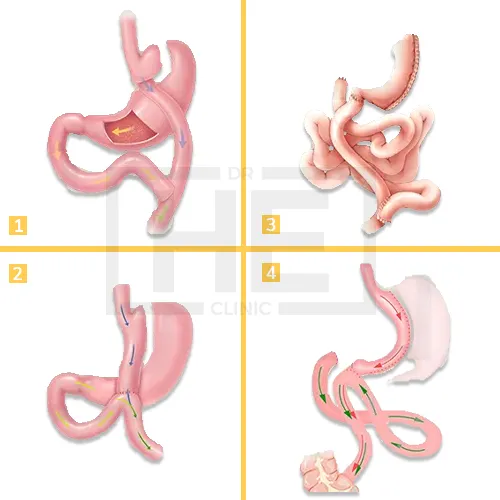What is Gastric Bypass Surgery?
Gastric Bypass Steps
1- Preparation: The patient receives general anesthesia and is positioned on the operating table.
2- Creating the Pouch: The surgeon uses surgical staples to create a small pouch at the top of the stomach. This pouch will become the new, much smaller “stomach” that will hold food.
3- Dividing the Small Intestine: The small intestine is divided into two sections: the upper part (jejunum) and the lower part (ileum).
4- Bypassing the Stomach: The jejunum is connected directly to the newly created pouch, bypassing the remaining portion of the stomach. This reroutes food so it bypasses a significant portion of the small intestine where nutrients are usually absorbed.
5- Connecting the Intestinal Segments (Jejunojejunostomy): The two divided sections of the jejunum are then connected to create a continuous digestive tract.
6- Closing the Incisions: The incisions are closed with sutures or staples.
Types of Gastric Bypass Surgery

Roux-en-Y Gastric Bypass: This is the most common and well-established type of gastric bypass, as described in the previous steps. It offers a good balance of restriction and malabsorption, leading to significant and sustained weight loss.
Mini Gastric Bypass: This is a simplified version of the Roux-en-Y bypass, involving fewer incisions and a shorter operating time. It is suitable for patients with a lower BMI or those who are at high risk for complications from major surgery.
Biliopancreatic Diversion with Duodenal Switch (BPD-DS): It involves bypassing a much larger portion of the small intestine, leading to greater malabsorption and more rapid weight loss.
Single Anastomosis Duodeno-Ileal Bypass with Sleeve Gastrectomy (SADI-S): This is a relatively new procedure that combines elements of sleeve gastrectomy and biliopancreatic diversion. It involves removing a large portion of the stomach and then bypassing a significant portion of the small intestine.
Transit Bipartition: Transit Bipartition (TB) is a relatively new bariatric surgery technique that combines aspects of malabsorption and restriction to induce weight loss. In this procedure, the stomach is partially divided to create a smaller pouch, similar to a sleeve gastrectomy, which restricts the amount of food that can be consumed.
Recovery After Gastric Bypass Surgery
Recovery after gastric bypass surgery typically takes place in several stages, each with its own focus and considerations.
- Hospital Stay (1-3 days)
You will be closely monitored for pain, infection, and other potential complications.
You will start with clear liquids, progressing to full liquids and then soft foods as tolerated.
- Early Recovery at Home (2-4 weeks)
You will continue with the staged diet plan, gradually introducing solid foods into your diet.
Focus on small, frequent meals and prioritize protein to ensure proper nutritional intake.
- Later Recovery (4-12 weeks)
You will gradually transition to a regular diet, focusing on healthy, balanced choices.
Exercise can be gradually increased, building up to your pre-surgery activity level or exceeding it.
Weight loss will likely be most rapid in this period, but the focus should shift to sustainable lifestyle changes for long-term success.
- Long-Term
Regular checkups with your doctor are essential to monitor your weight, nutritional status, and check for any potential complications.

Miss Tuğçe
Safety and reliability when choosing a doctor
Gastric Bypass Surgery Turkey Cost 2024
The cost of gastric bypass surgery in Turkey in 2024 varies, but it typically ranges from approximately $3,000 to $6,000 USD, depending on various factors.
These factors can include the specific clinic or hospital, the surgeon’s experience, and the details of the surgery package (which may include pre-operative and post-operative care, accommodation, and transfers).
| Region | Average Gastric Bypass Surgery Cost |
 Turkey Turkey | $3,000 – $6,000 or more |
 USA USA | $7,000 – $12,000 or more |
 Canada Canada | $7,000 – $12,000 or more |
 UK UK | £6,000 – £8,000 or more |
 Australia Australia | AUD 7,000 – AUD 15,000 or more |
 Germany Germany | €6,000 – €10,000 or more |
 France France | €6,000 – €10,000 or more |
Why does Gastric Bypass Surgery Cost in Turkey Cheap?
- Economic Factors: The cost of living and operational costs in Turkey are generally lower than in many Western countries. This economic difference allows for lower prices for various services, including medical procedures.
Currency Exchange Rates: For many international patients, especially those from countries with stronger currencies, the exchange rate can make medical procedures in Turkey more affordable.





Gastric Bypass Surgery Before and After Photos
Submit your request for access to before and after photos to see actual patient results from our many cosmetic procedures and treatments at Dr. HE Clinic.
Gastric Bypass Surgery Turkey Reviews

Posted on
Truspilot
Posted on
TruspilotIs it Safe To Have A Gastric Bypass Surgery in Turkey?
Surgeon’s Qualifications and Experience: The surgeon’s expertise is a critical factor. Look for surgeons who are board-certified and have extensive experience in performing gastric bypass surgeries. Many Turkish surgeons are well-trained and often have experience working in or collaborating with international medical institutions.
Patient Testimonials and Reviews: Researching and reading testimonials and reviews from previous patients can provide insights into their experiences and the quality of care received.
Let’s Get In Touch
Frequently Asked Questions About Gastric Bypass Surgery
Does Health Insurance Pay for the Gastric Bypass Surgery?
Health insurance coverage for bariatric surgery, such as gastric sleeve surgery, has expanded in recent years. Many group health plans, as well as Medicare policies, now provide coverage for these procedures, recognizing them as medically necessary for obesity-related conditions. Coverage specifics, including limitations and requirements, can vary significantly among different insurance providers.
How Long Does Gastric Bypass Surgery Take?
Gastric bypass surgery typically takes about 1 to 2 hours to complete. The surgery is performed under general anesthesia, ensuring that patients don’t feel pain or discomfort during the procedure. This time frame is a general estimate and can vary depending on individual circumstances and the specific techniques used by the surgeon.
Is Gastric Bypass Surgery Painful?
Is There a Scar After The Gastric Bypass Surgery?
Yes, there will be scars after gastric bypass surgery, but their size and prominence depend on the surgical technique used. Most gastric bypass surgeries are performed laparoscopically, involving small incisions rather than a large open cut. This approach typically results in several small scars instead of one large scar. These scars are usually a few centimeters long and may fade over time.
QUALITY CERTIFICATES


















Posted on
Truspilot